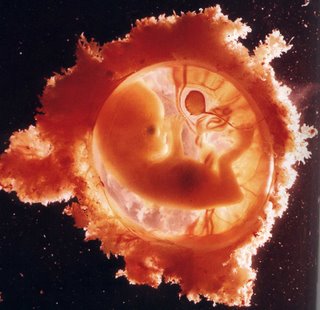
mood: tired but excited - big weekend coming.
state i'm in: excited that i could write the three words in the title in proper english, and not in some barstardised form.
tune: madonna "something to remember" LP (still!?).
achievement for the day: all the study i wanted to do is done!
time and time again i am astounded that i am even here, than any of us actually make it. that journey from conception to birth is a feat the likes of which none of us will ever have to come up against in our lives again. no other single experience in our lives will come even remotely close. the route is littered with traps, pitfalls and hurdles. let me describe one of them...
foetal haemolytic anaemia:
stated simply, this condition is effectively the rejection of the foetus by the mother in the same fashion that a transplanted kidney might be rejected.
each of our red blood cells has proteins on their surface that mark them as type A, B, or O. likewise, the presence or absence of another protein marks them as rhesus positive or negative (that's right, rhesus as in the monkey, where they were first discovered).
incompatibility based on surface rhesus proteins can come about when a rhesus negative woman is impregnated by a rhesus positive man, and the conceptus is also rhesus positive. red blood cells cross the placenta and enter the mother's circulation throughout gestation. they are subsequently recognised as foreign, and marked with antibodies, just as a virus, bacteria, or cancer cell would be. fortunately for the foetus, the mother's immune system has not yet built up sufficient antibodies to the foetal cells, and pregnancy proceeds normally.
then along comes rhesus positive foetus number two.
as soon as red blood cells from this foetus begin crossing the placenta, the mother recognises this as foreign. this time the immune system posesses the necessary weapons of mass destruction, and is poised to attack.
and so it does.
fortunately, this can nowadays be overcome with injections during pregnancy to destroy foetal cells before the mother becomes sensitised to them. nevertheless, with a failure rate of about 2%, one in 50 of these bubs never makes it.


No comments:
Post a Comment